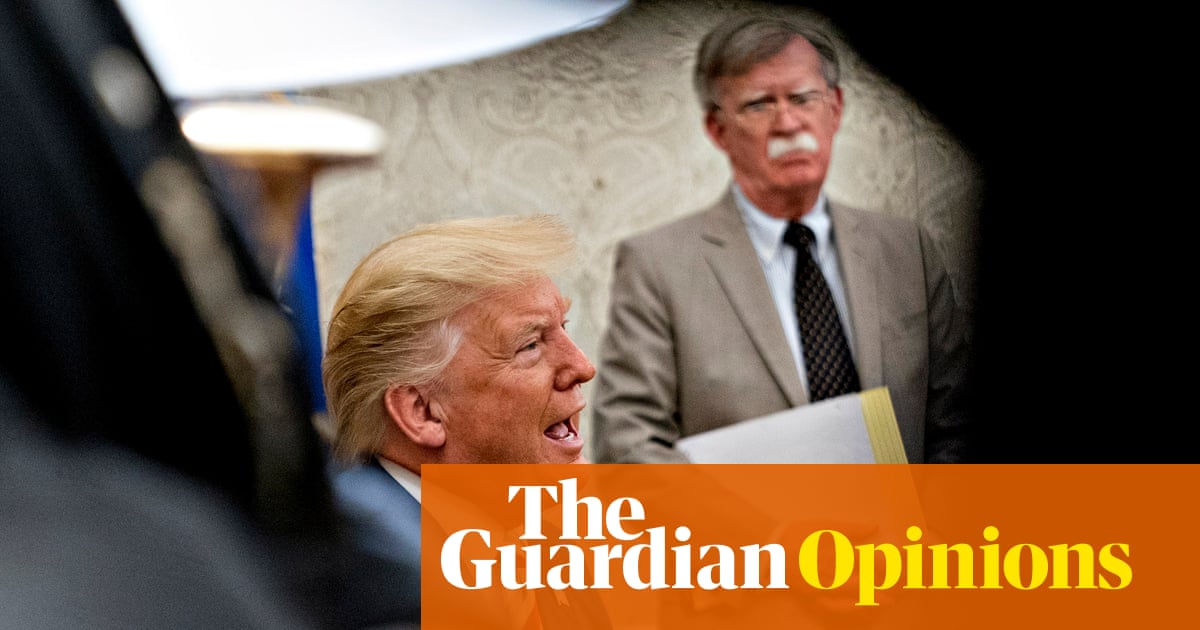
John Bolton’s memoir of his time in the Trump administration tells us many things that we already know. The president understands very little about how the world works, treats his office as an extension of his personal and family interests, and is obsequious to foreign dictators.
According to Bolton’s new book, Donald Trump asked China to increase purchases of American farm products not to help US voters, but to bolster his own re-election chances. He is so enamored of foreign dictators that he praised Xi Jinping for China’s mass imprisonment of Muslim Uighurs. Bolton also claims he publicly defended Crown Prince Mohammed bin Salman after Jamal Khashoggi’s killing, because he wanted to create a distraction from unfavorable news coverage of his daughter Ivanka.
To any objective observer, this subordination of American foreign policy to the immediate political needs of one man has been a disaster, shredding Washington’s credibility and goodwill around the world. Bolton, likewise, seems to have found it intolerable. But this is a disaster in which his own vision is implicated, and from which it is unlikely to recover. Only the sheer vacuity of Republican foreign policy enabled Trump to persuade so much of the party’s base to embrace his own selfish, incoherent leadership.
There are no heroes in this story. Bolton is a figure with dangerous views who failed to reveal what he knew about Trump during the impeachment trial earlier this year, when it might have mattered. But the split between Trump and Bolton – and the two brands of nationalism they represent – also tells us something about the hollowness of today’s Republican party as a governing force. Neither the unreconstructed hawkishness of Bolton nor the intellectual vacuum of Trumpism provide a blueprint for American foreign policy, and the party has run out of other ideas.
Bolton’s nationalism consists of a fierce skepticism of diplomacy, at least when not combined with threats of force, and a willingness for America to act unilaterally to get its way. Although he has always been more in favor of what is euphemistically called “regime change” than most elected Republicans, his aggressive rhetoric, scapegoating of foreigners, and dismissal of constraints on American action overseas is embraced by his party’s mainstream – including rising figures such as Senators Josh Hawley and Tom Cotton.
During his capture of the Republican party, Trump synthesized his own version of nationalism. He combined Bolton’s aggressive flag-waving with a conviction that foreign wars were an elite indulgence which harmed lower-income and lesser-educated white voters, the chief audience for Trump’s nationalist vision.
But an even stronger component of Trumpian nationalism is the president’s belief that his own interests are identical to those of the US. To his supporters, he personally embodies American interests, allowing him to perform dizzying policy U-turns according to the needs of the moment. Trump ultimately has no use for ideologues, whose firm beliefs get in the way of his desire to bend every institution and relationship to his own personal ends.
For a long time, conservative foreign policy has been based not on ideas but on what Lionel Trilling famously called “irritable mental gestures which seek to resemble ideas”. Foremost among these gestures has been a knee-jerk opposition to multilateral cooperation and constructive diplomacy, even as the world has become more globalized and power has diffused away from the United States. Republicans are keen to rip up the solutions to hard problems offered by others without being able to offer any of their own – just as they did by destroying the Iran nuclear deal without offering any alternative way of preventing Iran from obtaining a nuclear weapon.
As a result, the party has been left without any credible vision of America’s place in the world. Such a hollow shell was easy prey for a corrupt, immoral demagogue. The party and the country have been left in the hands of a president who does not try to advance the country’s interests, or even to seriously understand what those interests are separate from his own re-election campaign.
But simply getting rid of Trump won’t solve the problem, which is rooted in the Republican party’s dismissal of both the facts of the modern, globalized world and the responsibilities of governance. Bolton might know where Finland is, but in his own way he is just as detached from reality as the president. And in the silence he shared with so many Republican colleagues during the impeachment trial, he has also shown how little he regards the safety, institutions and values of the nation.
Whatever their differences, Bolton and Trump ultimately have a lot more in common than they seem to think. They represent two faces of a Republican party which has completely lost any right to the public’s trust in its handling of American government, at home or abroad. It is hard to see at this point how it could ever win it back.


